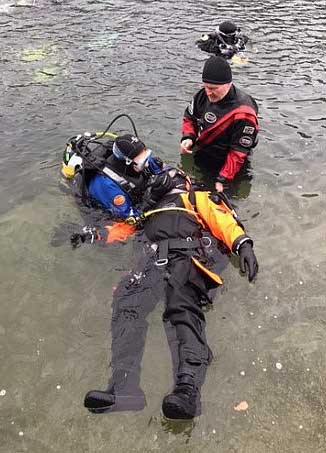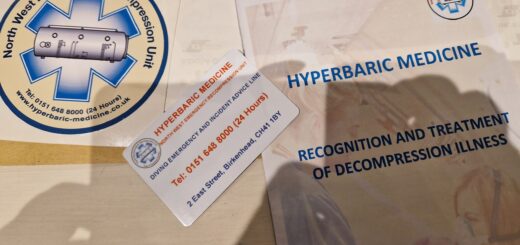Practical Rescue Management Feb 2022
The branch finally managed to complete another one of the outstanding Skill Development Courses that had been postponed due to the Covid pandemic. So on February 13th, a group of eager students and instructors gathered at Eccleston Delph Dive Centre to get the course underway.
The weather forecast for the day was persistent rain, heavy at times but thankfully, the weather Gods smiled upon us and the whole day stayed dry apart from the final half hour or so.
We all met around 8.30am and new member registrations and renewals were completed before assembling in the café for a welcome and brief discussion about the day’s proceedings. This was followed by a discussion on various types of incidents that we as divers might encounter during our days out whether it might be on land or at sea. The emphasis of the discussion was on the possible dangers and keeping safe during a rescue. This led into the introduction of the Dive Managers role and the problems that they might face. With this all fresh in the student’s minds, they split up into three small groups each having both a lead and assistant instructor to teach them.
The plan for the morning was for these three small groups to work their way through a couple of scenarios, working at a slow deliberate speed with the instructors guiding them through the process of carrying out a rescue and teaching the methods that might be required as well as encouraging the students and correcting any poor techniques.
Also included in the morning session was a spot of rope throwing to a potential casualty. The rope throwing practice always brings an element of fun and laughter to the session. It can actually become quite competitive as well with everyone trying to outdo each other. Thankfully no ropes were lost on this session as everyone remembered to keep hold of one end of their rope. I’ll say no more about that!
This brought the morning session to a close and all the teams assembled at the café for lunch and an informal chat about what they had been doing during the morning. There were plenty of laughs emanating from the group so it seemed that they were all enjoying the course so far.
The plan for after the lunch hour was for the three small groups to merge into two larger groups where the scenarios would be managed by the teams with the instructors mainly observing but coaching and prompting whenever necessary. So during the lunch break, the instructors for the two groups assembled and decided what scenarios that they were going to allocate to their respective groups. Each group would complete a minimum of two scenarios so that all members of the team would be able to complete the various roles such as Dive Manager, rescuer, casualty etc.
The weather was holding up so the group briefings took place at the waterside. The instructors gave the group members an outline of what the scenario would be then the groups decided on their roles and responsibilities. The group that I observed which was led by Steve McElroy, Alan Jones and assisted by Stuart Langley had a lost diver reported for their first scenario so obviously that consisted of an underwater search and rescue by some group members followed by full life saving procedures encompassing the use of a defibrillator and Oxygen administration. Due again to the Covid guidelines, no rescue breaths were performed but the reasons for this were re-emphasised to the students. At the point when life support was required, the actual casualty was replaced with a resuscitation mannequin.
Their second scenario had a twist in the tail. The group were told that it was two divers on the surface with one of them in a distressed condition and being towed in by their buddy. The twist was that they didn’t know that the diver conducting the towing was going to suffer a suspected heart attack. Well this really did kick the team into action as they now had two casualties and really had to start to think about their priorities!
After each scenario, the groups were debriefed by their instructor team. Particular attention was given to their input into the discussion, giving their thoughts on what went well and what they could do to improve their performances going forward.
The other group which was led by Michele Woodward, Alistair Reynolds and assisted by Steve Mills covered scenarios were on the first, two divers surface close to their cover boat but with one of them clearly distressed. The distressed diver then sinks back to the sea bed so a search and recovery was initiated. Thankfully the outcome was a good one as they had the second wave of divers already kitted up waiting to go in once the first pair had returned.
Their second scenario was where a pair of divers on a club dive out to a shallow wreck overrun their agreed dive time. Divers where sent in to search for them. They found the pair of divers but one of them was tangled in fishing line, starting to panic and running low on air. Not a nice situation to ever find yourself in! The importance of carrying your own personal cutting tool became evident in this scenario.
Just like the other group, the instructors debriefed the team, drawing out their thoughts on what went well, what if anything they would do differently. The students were encouraged to become proactive and consider the ‘what iff’s’.
With the afternoon scenarios completed, the groups went back to the car park area for a short debrief before heading off for home or the White Lion pub. Invariably, the topic of conversation in the pub centered around the course. It appeared that the students enjoyed the day. What it did do was got everyone involved thinking about what they could do to make their diving safer and thereby more enjoyable which I would personally take as a sign of a successful course!
I would like to express my thanks to the students for taking part so enthusiastically and putting themselves in the hands of the instructor team. They were in no particular order, Chris Mills, Kate Mills, Andreea Gamulea, Andy Parsons, Dave Barlow, Kelly Bird, Katie Condron, Nigel Thomas, Phil Bradley & Viki Walsh.
I would also like to express my gratitude to the instructor team for giving their time to teach on the course. They were Alistair Reynolds, Steve McElroy, Alan Jones, Michele Woodward, Garry Bolland, Steve Mills & Stuart Langley.
A special thanks to Garry Bolland who assisted me greatly when my printer died a death. And thanks to Ray Cramer for the loan of some ropes.
A big thanks also to the lads at Eccleston Delph Dive Centre in particular Andy Godber who was so very helpful whenever a favour was requested!













